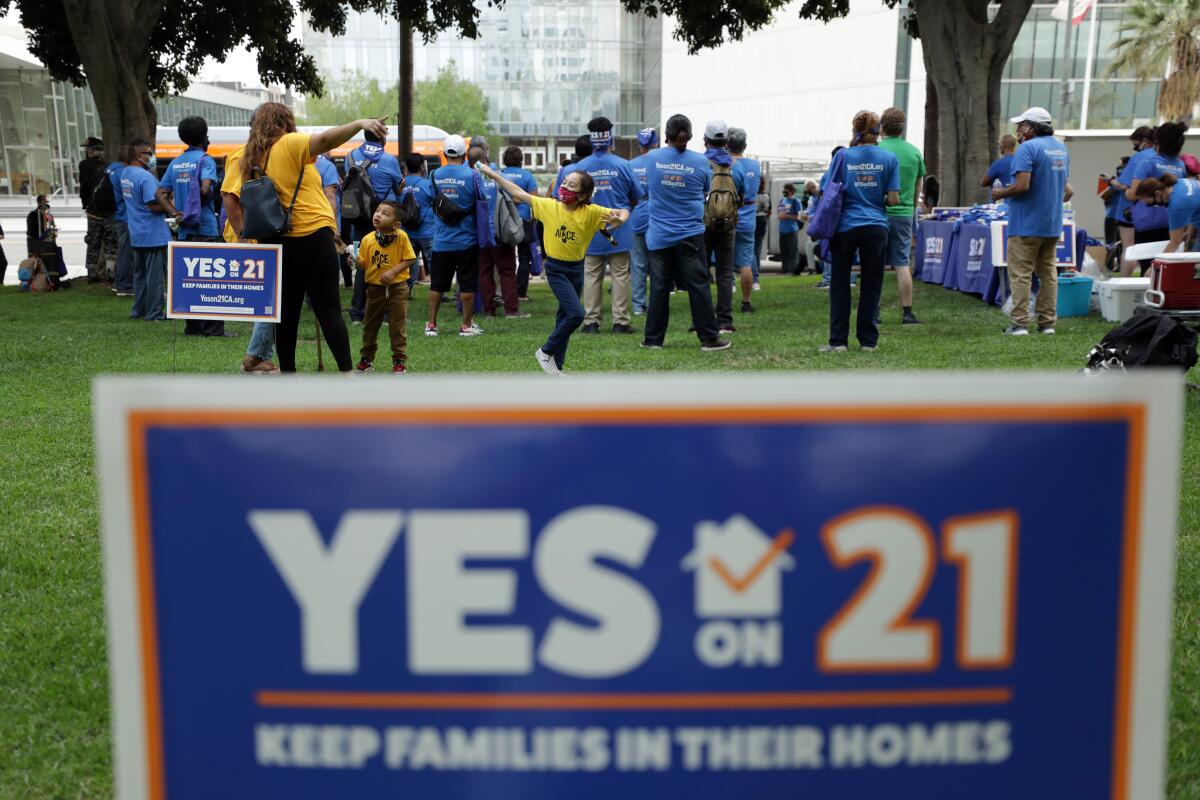Proposition 21 rent control expansion faces steep hurdle to passage, new poll shows

- Share via
A bid to expand rent control in California faces a large hurdle to pass in November, a new poll of voters statewide has found.
Just 37% of likely voters are supporting Proposition 21, which would give cities and counties greater authority to implement rent control in their communities, according to a poll from UC Berkeley’s Institute of Governmental Studies, which surveyed Californians earlier this month.
Another 37% percent of likely voters were opposed to the measure with 26% still undecided, the poll found.
Though a large number of Californians have yet to make up their mind, the fact that so few voters are in favor of the ballot measure six weeks before election day means that proponents face major challenges, said Mark DiCamillo, the institute’s poll director.
Typically supporters would need to have majority support at this stage to withstand an onslaught of negative advertising aimed at sowing doubts about an initiative’s effectiveness and potential unintended consequences, he said.
“The burden of proof is always on the ‘yes’ side,” DiCamillo said. “You’ve got to convince people to change the status quo. It’s a tall order.”
Currently, local governments in California face limits on implementing rent controls due to the Costa-Hawkins Rental Housing Act. The law prohibits cities from controlling rents on buildings constructed after 1995, the year the law passed, or earlier in some cities, such as Los Angeles and San Francisco, that had prior rent control policies.
If passed, Proposition 21 would give cities significantly more authority to expand rent controls. Local governments could pass local laws allowing rent control on apartments that are at least 15 years old. They could also put rent controls on single-family home or condominium rentals if the landlord owns more than two properties. And cities would be allowed to control rents on apartments when existing tenants vacate them — new renters could pay lower rates, provided that cities allow landlords to increase rents on vacant units by at least 15%. The Costa-Hawkins law currently prohibits rent controls on single-family homes, condominiums and on vacant units.
Support and opposition for Proposition 21 fall among expected partisan and demographic lines, the poll shows.
A majority of Democrats back the measure while nearly three-quarters of Republicans are opposed, the poll found. Half of renters are in favor compared with only 28% of homeowners. Voters under 50 are significantly more likely to support Proposition 21 than senior citizens. The poll also found that nearly 6 in 10 Black likely voters are backing the initiative while just one-third of white likely voters do.
Proposition 21 is a modified version of a rent control initiative that appeared as Proposition 10 on the ballot in 2018. Proposition 10 would have repealed Costa-Hawkins, giving cities free rein over rent control policies. Nearly 60% of voters rejected that measure.
Supporters could find some hope that the electorate in a presidential election year — with expected higher turnout of renters and younger and nonwhite voters — is likely to be more friendly to a rent control initiative than those who voted in 2018, DiCamillo said.
“It’s an optimal electorate for something like this,” he said. “But I still think its chances of passing are less than even.”
The Los Angeles-based AIDS Healthcare Foundation is bankrolling Proposition 21, and has raised nearly $23 million for its campaign. The organization also was behind the rent control initiative two years ago. The 2018 campaign topped $100 million, with opponents, predominately large landlord interests, outraising supporters more than 3 to 1. Landlord groups are expected to significantly outspend supporters again this year.
The UC Berkeley poll was administered online in English and Spanish Sept. 9-15 among 5,942 likely California voters in the Nov. 3 election. The overall margin of sampling error is approximately plus or minus 2% and with a higher margin of error among demographic subgroups.
More to Read
Sign up for Essential California
The most important California stories and recommendations in your inbox every morning.
You may occasionally receive promotional content from the Los Angeles Times.







